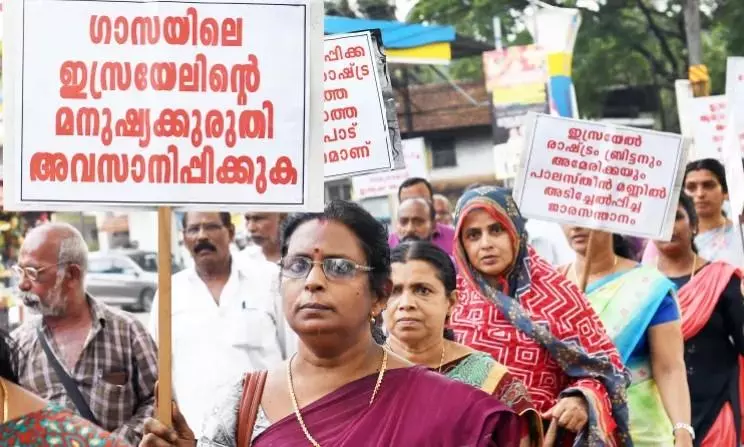
Is it a crime to seek donations for suffering Palestinians? UP Govt books imam for it
text_fieldsThe Uttar Pradesh government’s increasing intolerance towards Muslim causes—regardless of their humanitarian nature—has once again been exposed after an imam in Bijnor was booked for allegedly collecting donations for suffering Palestinians, in what residents see as a continuing pattern of criminalising Muslim-led initiatives.
Ever since the right wing came to power in the state, Muslims have found even peaceful expressions of solidarity being treated with suspicion, as acts of compassion are selectively penalised under the pretext of law and order.
Maulana Zaki, the long-serving imam of Jama Masjid in Sherkot, was accused of threatening locals with a fatwa if they refused to contribute to relief efforts for Gaza, though he has denied these allegations and has been unable to respond formally due to ill health.
The complaint, filed by a resident of Mohalla Shekhan, Irshad, alleged that Zaki and his associates were forcefully collecting money, and the police registered a case based on these claims, invoking serious charges despite providing no evidence of coercion.
Muslims in Sherkot and nearby areas have strongly condemned the police action, calling it politically driven and indicative of rising hostility against their right to humanitarian involvement. Several residents insist that Zaki merely appealed for donations after Friday prayers, with no threats issued or pressure applied, and they believe the case was registered under pressure from right-wing Hindu groups seeking to suppress Muslim visibility in global causes.
Many see this incident as part of a wider pattern across Uttar Pradesh, where even praying for Gaza has brought scrutiny and punishment.
Residents who frequent the mosque denied hearing any mention of a fatwa, while even those who did not contribute confirmed they were not pressured, describing the donation drive as peaceful and voluntary.
Several women, children, and elderly citizens had donated small amounts out of compassion, yet they now fear being targeted, with some students worried that police might summon them simply for participating in what they believed was a noble cause. The fear has created a chilling effect, with many Muslims saying they are now hesitant to even pray publicly for Gaza or raise money for humanitarian needs.
While CO Afzalgarh Rajesh Solanki confirmed that an investigation is underway to verify whether foreign funding laws were violated, legal experts in Bijnor argue that unless the police can provide concrete evidence, the case may not stand in court. They maintain that collecting money for international humanitarian crises is not a crime unless it involves an unlawful transfer of funds, which the police have yet to prove.
Community members familiar with Zaki describe him as a gentle, respected figure who leads prayers and teaches children, and they assert that his only act was to extend support to the suffering in Palestine. Locals believe that right-wing groups have long monitored Muslim gatherings since the Gaza war began, often lodging complaints to provoke police action. This latest case, they argue, represents not only an assault on religious freedom but a deepening of the divide between communities.
The incident has stirred strong reactions from Muslim organisations across the state, many of whom claim that expressing empathy for Palestinians is enough to bring state action upon them. While Hindus are allowed to raise funds for temples abroad without interference, Muslims feel they are punished for similar gestures, reinforcing what many describe as a double standard.






